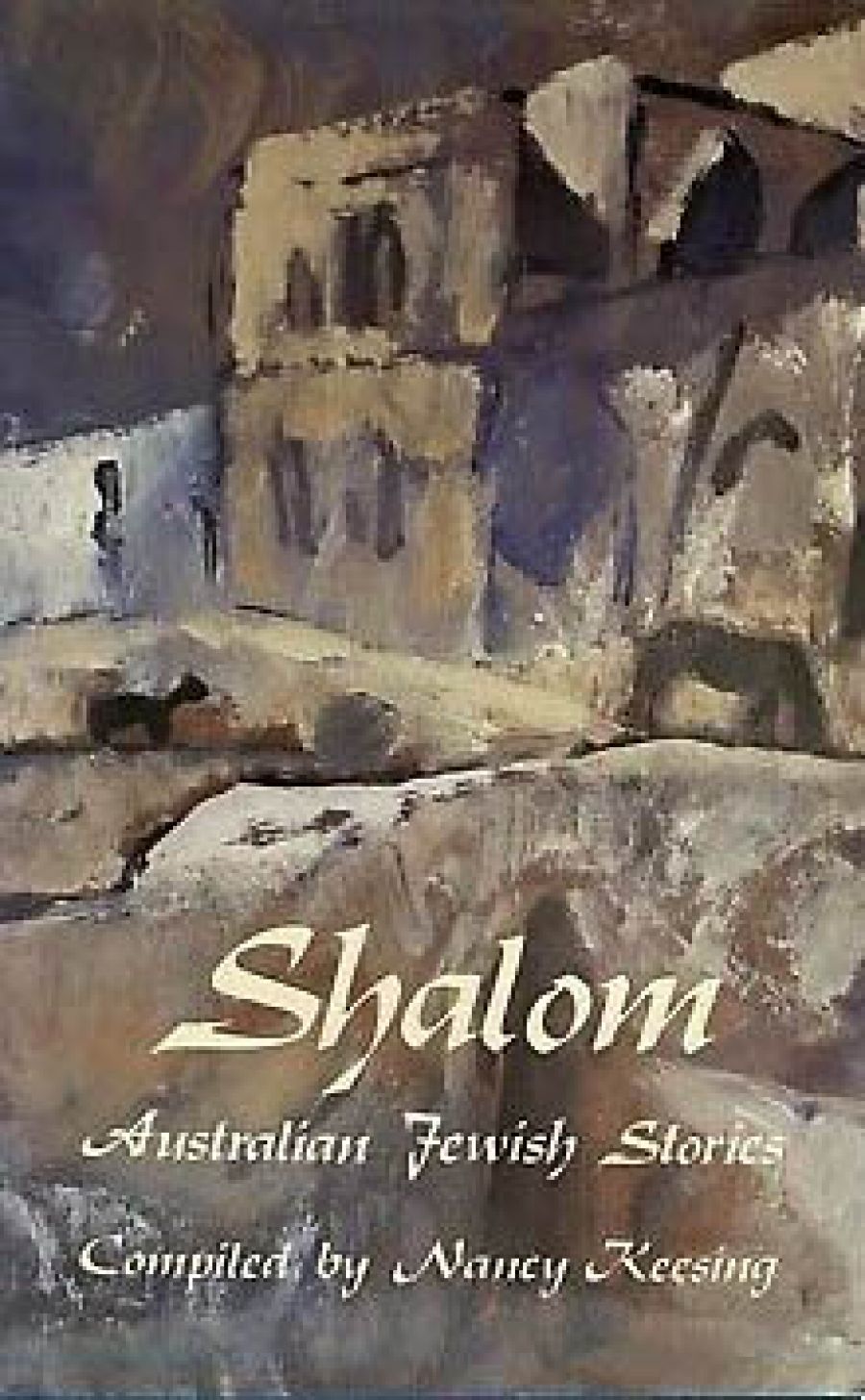
- Free Article: No
- Contents Category: Short Stories
- Review Article: Yes
- Online Only: No
- Custom Highlight Text:
Shalom, compiled by Nancy Keesing is I think a brilliant and moving collection of short stories.
Ms Keesing, an indefatigable compiler, has brought together for the first time a selection of Jewish stories and. arranged them in three sections, each one of which throws light on a certain aspect of Jewish life, either in Europe, in Australia over a long period, or in the present Australia-Israel conflict. This is a fine and sensitive arrangement of the stories.
- Book 1 Title: Shalom
- Book 1 Subtitle: Australian Jewish Stories
- Book 1 Biblio: Collins, 238 pp, $8.95 pb
There are nineteen stories in the collection representing fourteen authors, five of whom are women. A bibliography gives useful background information on the authors.
Well known writers such as Hertz Bergner, David Martin, Judah Waten, and Morris Lurie are included in the anthology. There is a story by the first native-born Australian writer of fiction, John Lang, ‘Music a Terror’, an amusing glimpse at the early days in the colony and the impact made by a piano on the children in the bush and on the ‘savages’. It is a neat but rather formal story.
In the first section, Europe, the writers remember and explore their countries of origin. In ‘A Man’, Lilia Barnea gives a brilliant and poignant insight into the fear of a young Polish Jew in war torn Warsaw, escaping from the ghetto to return to his estranged wife. It’s a moving story on several levels, large scale fear and personalised fear being explored.
A second story by Barnea, ‘My Grandfather’, is included. Here she looks at her childhood days in pre-war Warsaw and shows family life in a well-to-do Jewish family. Her grandfather, with his strength, his impressive bearing, his style, was a very important reassuring figure in her early childhood, but when war broke out, with all his power he ‘could avert nothing’. When he denies her Jewishness, she ‘stopped being a chilp’. Two translations by Judah Waten appear in this section, and a tragic story by Hertz Bergner and a chilling tale by Pinchas Goldhar. ‘Doris and other Frauleins’ by David Martin explores important influences in his German childhood and an extract, ‘Going Back’, from his novel Where A Man Belongs completes this first part. This last story is well placed to lead into the main section of the book which looks at Australia.
Here are stories which give a wonderful insight into the Jews as migrants, coming to this country from many parts of the world, sharing the universal problems of people moving from the known to the unknown, at any time. The stories are all of a high standard, and all add something to a total picture being established of Jewish life in Australia. Some are amusing, like Lurie’s ‘My Greatest Ambition’, or full of warmth, of insights into Jewish family life and the complexities of relationships, such as in ‘Bailey’s Pine’ by Len Fox. The yearning, the cynicism, the loneliness of the young boy arriving to meet his unknown guardian in an unknown land is well brought out in Waten’s story ‘A Peaceful Life?’
‘Made in Czechoslovakia’ by June Factor is a gem – an insight into the high expectations of a young fastidious Polish youth, Yossel, arriving in Melbourne just before the war. The supportive warmth and kindness of other Jewish people comes through, as does in the end the tragic comic love extended to the mistaken compatriot. A very powerful emotional perceptive story is ‘Hostages’ by Fay Zwicky, with its opening line: ‘I think I began to hate when I was 12.’ She explores the feelings of the talented girl, forced to learn music from a teacher she believes she detests, as part of her mother’s philanthropy, a hostage at the music stool. And when it all finishes, her realisation of her loss. Brilliant writing here – the young girl: ‘I raised my eyebrows insolently as the girls did at school after one of my own ill-judged observations. It was essential to the code governing the treatment of victims’. She’s been through it and she knows full well what she does.
‘Original Anzac’, by Lysbeth Cohen, also shows the warmth of Jewish family life, set against that great Australian tradition. Anzac Day. The problems of the ‘Fat Girl’, Jewish, intelligent, striving, caught in a mother/daughter conflict, are well brought out in the pain of the short story of that name by Harry Marks.
Two gripping stories make up the last section, Australia-Israel. The first is by the compiler, Nancy Keesing – ‘Middle Eastern Questions’. She looks at that strange emotion we all feel at times, ‘unreasoning, unreasonable, unsuitable prejudice,’ as she drives in a taxi driven by a talkative, hairy, middle eastern driver. Will she confront and admit her Jewishness or will she leave it alone? – a position we have all found ourselves in. The final story, a passage from Morris Lurie’s Flying Home, completes, in every sense of that word, the anthology.
In Shalom, Nancy Keesing hoped to yield insights into Australian Jewish life and thought, and in a more general way migrant experience, and this I certainly feel she does. The majority of the stories she has included are highly personalized vignettes which penetrate a fascinating area of life. I feel heartened as a teacher and general reader that such short stories are available in an anthology like this and I feel they will appeal to a very wide reading public.


Comments powered by CComment